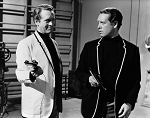|
A Fancy Bloke posted:It's because business culture has at its core this weird, overwhelming urge to expand and diversify regardless of if the market will bear it. Just making profit year over year isn't ever enough sears.txt Sears was started in the 1890's as a mail order business to compete against local general stores (think of all those westerns with "General Store" on one of the buildings - they were Sears competition). The guys Sears worked on railroads, and he saw all the middlemen tacking on markup as products moved west in the distribution chain until they go to the stores. So he started a catalog, the famous Sears catalog in 1893. It was 300 pages, and had everything. Now think about this for a second. In 1893, you had a mail order catalog that sold pretty much everything that was for sale in 1893 - machinery, bikes, toys, dry goods, etc. Does this sound like another business you know? So every year the catalog comes out, and after a few decades it becomes an American institution. For much of the population, the Sears catalog includes a decent quality, low cost version of every mass market nonperishable consumer product in the United States that wasn't a car (they did sell those at one point very early on. They also sold mobile homes too, up to the 1940's). You could pick anything from the catalog, mail in your order with a check, and in a few days/weeks you'd get it. If you didn't like it, for any reason, Sears had a "satisfaction guaranteed" policy that you could return it at anytime for a full refund. Now pay attention, because here's where it gets good. In 1931, Sears starts an insurance company - Allstate. It buys financial investment firm Dean Witter and real estate broker Coldwell Banker in 1981. In 1984 it starts a joint venture with IBM called Prodigy, an online computer service, sort of a prototype AOL. In 1985, Sears launches a new major credit card, the Discover card. For the next eight years, the only credit card you can use at Sears is Discover. At this time, the early 80's Sears is the largest retailer in the U.S. By 1993, the 100th anniversary of the Sears Catalog, Sears had built up considerable goodwill in the mind of consumers. They weren't the lowest price, but they had what you needed at good prices and the service was second to none. They had real estate, insurance, financial planning, and all at good prices with top customer service. This is 1993. In quite possibly the greatest example of corporate shortsightedness, Sears shut down it's mail-order business in a cost cutting measure. It spins off Allstate that same year, and soon dumps Dean Witter and Coldwell Banker. In 1993, Sears had the most extensive and sophisticated mail-order retail operation on the planet and they closed it. Two years later, Amazon.com launched, and was soon selling everything that sears sold through it's catalog. By the late-90's Walmart's push of low-cost China imports killed Sears retailing. Online banking takes off. Credit card use surges as mail order and retail purchases are shifted online. Sears had its own computer network in 1993. They had access to IBM, they should have understood the power of the internet. All they had to do was shift the catalog online instead of killing it off, promising in store returns and the same Sears satisfaction guaranteed. Discover could have been the credit card of choice for security and protection online. Dean Witter could have been what Schwab, E-Trade and Ameritrade became. Back in the mid-late 90s when many people were hesitant to use credit cards online, Sears could have been a familiar face online. Sears could have used the Catalog to create searscatalog.com or wishbook.com and owned online retailing, owned amazon's business, owned online brokerage and banking, but they blew their chances to save a few bucks in 1993. They could have made huge profits in the early 2000s real estate boom by leveraging that success with their real estate arm (imagine if Amazon sold houses). By my estimates, Sears could have spent about $200 million in 1994-1996 to develop and promote retailing and financial services online, and they'd be reaping billions. Sears could still be a huge American company today, instead of a historical footnote. The lesson - arrogance and lack of vision. I look forward to the day in a few years when we can look back at the RIAA as a similar case study in lethargy, greed, and arrogance.
|
|
|
|

|
| # ? Apr 25, 2024 22:35 |
|
Xaris posted:
they're loving everywhere down here pizza bacon anchor tattoos, stupid old timey moustachios, hats too small for their head, IPA craft brews you've never heard of, shows for bands you've never heard of, the works look at this poo poo there's so many down here they have their own guidebook apps  just look at it   although yeah they prolly aren't in a Chipotle Moridin920 has a new favorite as of 18:07 on Aug 31, 2016 |
|
|
|
Xaris posted:
and I'm pretty sure the ones that do go are going because they need to eat lunch somewhere like everyone else, not because they're basing part of their identity around their love of Chipotle burritos
|
|
|
|
H.P. Hovercraft posted:sears.txt The other fun part in Sears as Amazon history is that when USPS started doing affordable package delivery to EVERY address in the US, Sears and other catalog companies exploded in growth, fueled by cheap shipping. This was in 1913. https://www.uspsoig.gov/sites/default/files/document-library-files/2015/rarc-wp-14-004_0.pdf That's a fun read about how the monopolistic shipping companies got They're still clobbering UPS and FedEx these days since they cut rates, because hey when you're rolling a truck to every address to deliver pizza coupons and realtor flyers 6 days a week anyway it doesn't cost that much more to put a few parcels on the truck at the same time.
|
|
|
|
Moridin920 posted:they're loving everywhere down here but anyways its a dumb derail so back to making fun of sears because lol holy poo poo
|
|
|
|
I was a hipster before it was cool EDIT: thread lessons for today: lego is a cool company because they decided to concentrate on toys instead of amusement parks sears is a bad company because they decided to concentrate on stores instead of real estate, stock brokers, etc. monster on a stick has a new favorite as of 18:28 on Aug 31, 2016 |
|
|
|
Previous discussion, but I worked at blockbuster in 2006. It was funny watching it turn into suncoast music, with all the stupid poo poo we had to peddle to customers, and slowly die. Those popcorn buckets we pretty cool though!
|
|
|
|
May I ask how Subway got so huge? I know they're like one of the top 5 biggest fast food places in the world, but just how did they pop up everywhere? Especially in a place like NYC where there is a kick-rear end deli every other block.
|
|
|
|
ProperCoochie posted:May I ask how Subway got so huge? I know they're like one of the top 5 biggest fast food places in the world, but just how did they pop up everywhere? Especially in a place like NYC where there is a kick-rear end deli every other block. http://www.franchisedirect.com/directory/subway/ufoc/915/ now i don't know why but it all seems like rich-ish indian families and poo poo will own like 10 of them. i guess they figure it's a good investment going into fast-food biz and it's cheap enough to keep plopping them down. Xaris has a new favorite as of 18:43 on Aug 31, 2016 |
|
|
|
Speaking of Blockbuster, you guys might be interested in listening to this. When Blockbuster announced they were going under, this guy tried to prank call a Blockbuster store. He ended up being able to trick the guy into getting him onto the final conference call with Blockbuster. Lots of interesting stuff from corporate like "make sure you sell that PS3 with the TV attached for top dollar! And don't forget everything including the toilet brushes are for sale!" Very interesting listen https://youtu.be/1X-F_UBvshM
|
|
|
|
canyoneer posted:The other fun part in Sears as Amazon history is that when USPS started doing affordable package delivery to EVERY address in the US, Sears and other catalog companies exploded in growth, fueled by cheap shipping. This was in 1913. USPS has also been in the black every year, except years of depression, since its inception. The postal service turns a profit, even though Fedex & UPS piggyback their shipments onto USPS flights at cost (or possibly free) and USPS does last-mile delivery for Fedex & UPS free for addresses that would be too cost prohibitive, like rural addresses. Fedex and UPS would go bankrupt if they couldn't steal from the federal mail service
|
|
|
|
ProperCoochie posted:May I ask how Subway got so huge? I know they're like one of the top 5 biggest fast food places in the world, but just how did they pop up everywhere? Especially in a place like NYC where there is a kick-rear end deli every other block. 5 bucks for a foot long sandwich you can eat for 2 meals if you aren't a pig and a general upswing into healthier eating in the US or at least the decline of fast food. Compared to burger joints, Subway has a lot more fresh greens on the menu for about the same price. Kick rear end delis are nice, but while more expensive are usually super meat and bread heavy in their portions as well.
|
|
|
|
natetimm posted:5 bucks for a foot long sandwich you can eat for 2 meals if you aren't a pig and a general upswing into healthier eating in the US or at least the decline of fast food. Compared to burger joints, Subway has a lot more fresh greens on the menu for about the same price. Kick rear end delis are nice, but while more expensive are usually super meat and bread heavy in their portions as well. they don't really even do $5 footlongs anymore, but otherwise thats true. though i'd have put "fresh" greens in quotes because its always sad translucent wilted garbage but i guess it will vary by location.
|
|
|
|
Xaris posted:they don't really even do $5 footlongs anymore, but otherwise thats true. though i'd have put "fresh" greens in quotes because its always sad translucent wilted garbage but i guess it will vary by location. They have six dollar ones now and yeah the greens aren't THAT fresh, but it fuckin' beats stuffing a Big Mac down your gullet by a mile.
|
|
|
|
red19fire posted:USPS has also been in the black every year, except years of depression, since its inception. The postal service turns a profit, even though Fedex & UPS piggyback their shipments onto USPS flights at cost (or possibly free) and USPS does last-mile delivery for Fedex & UPS free for addresses that would be too cost prohibitive, like rural addresses. Fedex and UPS would go bankrupt if they couldn't steal from the federal mail service Politicians love to make fun of the USPS as a money hole and a wasteful government program, but what's closer to the truth is that for the longest time Congress ties their hands with setting rates and also defining the USPS pension plan by law. So they told them they're not allowed to influence their revenue, and also aren't allowed to make any changes to their largest discretionary liability (retirement). Uncle at Nintendo posted:Speaking of Blockbuster, you guys might be interested in listening to this. When Blockbuster announced they were going under, this guy tried to prank call a Blockbuster store. He ended up being able to trick the guy into getting him onto the final conference call with Blockbuster. Lots of interesting stuff from corporate like "make sure you sell that PS3 with the TV attached for top dollar! And don't forget everything including the toilet brushes are for sale!" This is really great. Having been in a bunch of stuffy, hundred person conference calls it's refreshing to hear someone cause a ruckus.
|
|
|
|
Quick googling suggests that a six inch cold cut is more or less on par with a bug mac in calories. I think the sub is slightly more food, but my only recent Subway experience is at airports and I assume their sad little subs are not the norm across the chain.
|
|
|
|
bongwizzard posted:Quick googling suggests that a six inch cold cut is more or less on par with a bug mac in calories. I think the sub is slightly more food, but my only recent Subway experience is at airports and I assume their sad little subs are not the norm across the chain. Edit: every CS experience I have had with USPS has been so bad that I will always lay more to ship UPS/Fedex. I have both a PO box and a box at a UPS store and it is like night and day.
|
|
|
|
monster on a stick posted:EDIT: There are differences, but I wouldn't want your brain to overheat. In a class for college, one of our books mentioned the importance of the Sears Catalog. Especially in rural areas, it was one of the two most important books in the house, the other was the bible. Sears ending that was beyond stupid, when putting it online would be the next logical evolution.
|
|
|
|
USPS has been in trouble for years since Congress passed a poison pill bill that forced them to fund future retirement benefits 50 years in advance. This was done by a Republican congress that wants to see their services privatized.
|
|
|
|
bongwizzard posted:Quick googling suggests that a six inch cold cut is more or less on par with a bug mac in calories. I think the sub is slightly more food, but my only recent Subway experience is at airports and I assume their sad little subs are not the norm across the chain. It depends on what you get and how much veggies, etc. Also factor into the equation that nobody walks out of McDonalds without fries.
|
|
|
|
natetimm posted:It depends on what you get and how much veggies, etc. Also factor into the equation that nobody walks out of McDonalds without fries. Well, more veggies will just add more calories and I guess some small amount of fiber and vitamins. And while I will admit to maybe a quarterly Bigmac after a particularly long hike, I never get the fries. The beef tallow was the only thing they had going for them and without that they are sad sad things. And really I think If I just had a little packet of Russian dressing to suck on, I could skip the burger. That poo poo is so good, no idea why it never became a general burg condiment.
|
|
|
|
monster on a stick posted:EDIT: The lesson is that you play to your strengths. Lego's strength was cool toys. Sears' strength was mail order and brand recognition.
|
|
|
|
bongwizzard posted:Well, more veggies will just add more calories and I guess some small amount of fiber and vitamins. I'm like 90% sure McDonalds has nicotine or some poo poo in their food.
|
|
|
|
A Fancy Bloke posted:The lesson is that you play to your strengths. Lego's strength was cool toys. Sears' strength was mail order and brand recognition. Something tells me that monster on a stick is a huge jerkoff.
|
|
|
|
H.P. Hovercraft posted:They also sold mobile homes too, up to the 1940's). They're more closely associated with legit actual houses. Entire towns in the US were full of Sears Craftsman kit homes that were delivered by rail and assembled by the owner or a contractor. Everything from classic bungalows to things that would be considered mansions even by today's standards. An astonishing number are still standing.
|
|
|
|
Marv Hushman posted:They're more closely associated with legit actual houses. Entire towns in the US were full of Sears Craftsman kit homes that were delivered by rail and assembled by the owner or a contractor. Everything from classic bungalows to things that would be considered mansions even by today's standards. An astonishing number are still standing. drat you weren't kidding. i just looked that up and wow. also lol @ $2500 for a craftman kit house in 1923, that's still only like 35k in todays $$. fuckers had it super cheap back then.
|
|
|
|
Marv Hushman posted:They're more closely associated with legit actual houses. Entire towns in the US were full of Sears Craftsman kit homes that were delivered by rail and assembled by the owner or a contractor. Everything from classic bungalows to things that would be considered mansions even by today's standards. An astonishing number are still standing. I think it's really hard for anyone under the age of 30 to really grasp how huge Sears was. There isn't a company like it today.
|
|
|
|
H.P. Hovercraft posted:sears.txt Awesome post, thanks for this.
|
|
|
|
So was Sears Samsung level post-WW2? Interesting.
|
|
|
|
bongwizzard posted:Well, more veggies will just add more calories and I guess some small amount of fiber and vitamins.  more calories small amounts of fiber and vitamins in vegetables
|
|
|
|
Nonsense posted:So was Sears Samsung level post-WW2? Interesting. Sears was almost as ubiquitous in retail as Jello is to gelatin flavored dessert
|
|
|
|
H.P. Hovercraft posted:sears.txt I worked at a Sears catalog call center in 1992. It was your basic lovely call center job but they did employ lots of people. They only allowed 25 hours a week (so no benefits) and turn around was average. They required all reps to dress up (shirt and tie for men) because "if you look professional, you'll sound professional". It was rare to have a day where the calls didn't come in one right after the other so I have no idea why they thought that killing catalog sales was a bad idea. A few months before I quit they decided to take the existing call center staff and retrain them to take service calls. I believe it used to be that if you needed repairs to a washer, lawn mower, etc. you called the store and they sent someone out. Well someone decided that all local service numbers would now redirect to the call centers and we would book the appointments. Except this was the early 90s and computer networks were not very complex. So when someone would call to ask for someone to look at a dryer, we told them that someone was available between 10- 2 and would book the appointment. Then the local guy would contact the customer and give a more specific time. If someone called to ask where the repair person is, we had no way to tell. We'd just send a message (more or less email) to the local store and hope for the best. Also at some point Sears decided to get into the laundry soap business. We had to end every call with a sales pitch to buy this poo poo. Imagine calling to have your lawn mower worked on only to have someone give you the hard sell for detergent.
|
|
|
|
kazr posted:
Is there really enough volume of veggies on a 6" sub to provide a meaningful amount of nutrients? Honest question.
|
|
|
|
yes the spinach alone would hit like 50% of your recommended daily on multiple nutrients and add 10 calories
|
|
|
|
I'm not sure Sears could have transitioned that well. Mail order-in general died horrible deaths in the 90's (first Sears, then Service Merchandise). People wanted to go out and buy poo poo in stores because malls were cool. Retailers like JC Penney that kept their catalog business didn't see huge increases in mail-order sales once the Sears competition disappeared. I don't remember what their shipping times were like, but I know most everything you purchased in the 1980's and 90's took forever to arrive. Like 3 to 4 weeks easily. Amazon is the exception that proves the rule because while they managed to get a lot of stuff to you quickly, they also lost money for 15 years straight. I think we look at relatively new things like Amazon Prime and forgot how frustrating it was to order stuff via mail. Catalog sales were superior only until every town had a mall or lots of choices for clothing stores/appliances.
|
|
|
|
Krispy Kareem posted:I'm not sure Sears could have transitioned that well. Mail order-in general died horrible deaths in the 90's (first Sears, then Service Merchandise). People wanted to go out and buy poo poo in stores because malls were cool. Retailers like JC Penney that kept their catalog business didn't see huge increases in mail-order sales once the Sears competition disappeared. I remember it would take 6 to 8 weeks for most deliveries from catalogs in general. Of course I was sub-15, so it was just long enough to forget I ordered anything at all.
|
|
|
|
Krispy Kareem posted:I'm not sure Sears could have transitioned that well. Mail order-in general died horrible deaths in the 90's (first Sears, then Service Merchandise). People wanted to go out and buy poo poo in stores because malls were cool. Retailers like JC Penney that kept their catalog business didn't see huge increases in mail-order sales once the Sears competition disappeared. I think the take away isn't that Sears could just hold onto catalogue business and not change. Rather they should have toned it down while building the internal infrastructure to use the internet, so that once they had their infrastructure in place it was SEARS you went to online instead of Amazon. I don't think Sears would necessarily have eaten Amazon's lunch, but from the way that post sounds, they definitely had enough hands in enough cookie jars that they would have been well enough that they could have established some kind of permanent presence online be it through finance, insurance, or some niche specialty market. Instead they shut it down to compete with WalMart and welp.
|
|
|
|
Iron Crowned posted:I remember it would take 6 to 8 weeks for most deliveries from catalogs in general. Of course I was sub-15, so it was just long enough to forget I ordered anything at all. My mom would let me order GI Joes from the Sears catalog when I had done chores for a month, got A's, etc. I think it normally took about 10-12 weeks from putting the slip and check in the mail to getting my sweet muscly plastic men
|
|
|
|
Jastiger posted:I think the take away isn't that Sears could just hold onto catalogue business and not change. Rather they should have toned it down while building the internal infrastructure to use the internet, so that once they had their infrastructure in place it was SEARS you went to online instead of Amazon. I don't think Sears would necessarily have eaten Amazon's lunch, but from the way that post sounds, they definitely had enough hands in enough cookie jars that they would have been well enough that they could have established some kind of permanent presence online be it through finance, insurance, or some niche specialty market. Sears wouldn't have maintained a money losing online business for as long as Amazon had to. At some point they would have just thrown up their hands and closed it, because they already had a profitable retail presence. Kind of like how Wal-Mart.com spent 15 years trying to sell everything from appliances to mp3's and still hasn't figured it out. It's not a priority as long as they're making money elsewhere and by the time it is a priority it's too late. Even Amazon has trouble making online shopping viable. I wouldn't be surprised if they spun off their retail store in the next decade if it's performance drags down the stock value of their online services (where they make 90% of their profit).
|
|
|
|

|
| # ? Apr 25, 2024 22:35 |
|
As someone ancient enough to remember the ubiquity of Sears as well as sadly watch it's downfall, I think the major failure was the company embracing the SHOPPING MAWL as the penultimate revenue generator. The sad thing, it was a decent business plan at the time. Look, in 1992(when the decision was made)the Internet was a nerd curiosity, but the mall was the focus of consumer culture, and there was a Sears in practically every mall built anywhere at the time. Sears' executives more-or-less wrote off the huge number of rural and semi-rural consumers as moneyless rubes in their business decision to drop their catalog. IIRC, it had been making less money every year for like 20 years, and I'm sure a good business case was made to drop it; it only seems ridiculous in hindsight. People had been saying since the late Seventies "home computers are the future", but outside of gaming nerds and a few tech-savvy folks with money, nothing had changed. I can't fault the Sears executives for not seeing that within 5-6 years, homes computers would a)drop precipitously in price from 2-$3K(where they'd been for years) to under $500; b)globally shift to windowed operating systems that even a neophyte could use; and c)the Internet revolution. And at the time, mall culture was enormous(as were malls), plans were afoot everywhere for bigger and more ostentatious malls, with more things to do, more stores, MORE. And Sears was There. It was a can't-lose deal. I guess the true moral of the story is nobody ever knows what the gently caress is around the corner.
|
|
|


































